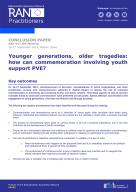Details
- Publication date
- 20 February 2024
- Author
- Directorate-General for Migration and Home Affairs
- Country
- Spain
- RAN Publications Topic
- Victims of terrorism
Description
On 26-27 September 2023, victims/survivors of terrorism, representatives of victim organisations, and other practitioners working with victims/survivors gathered in Madrid (Spain) to discuss the role of continued commemoration in preventing and countering further and future violence. Theoretical aspects as well as concrete examples linked to continued commemoration were presented and discussed. Special attention was devoted to the engagement of young generations, who have not directly lived through atrocities.
The following key aspects and elements have been identified and discussed during the meeting:
- Commemoration and remembrance serve as a reminder of ‘never again’ after atrocities have taken place. However, intentional and collective oblivion can be a temporary but necessary choice after a severely traumatic event.
- The process of remembering takes place at various levels; it can be a personal experience, but it can also contribute to the development of public knowledge.
- There can be a discrepancy between the collective or political need to (publicly and physically) commemorate, and an individual’s healing process limiting their willingness or capacity to participate in such activities.
- The role of institutions in collective remembrance is essential. In addition, it is key to note:
- When remembrance only happens at the grassroot level and it is completely absent at the political and institutional level, it cannot be fully successful;
- The involvement of victims/survivors is key to identify needs and priorities and to integrate the official narrative that might be promoted by decision-makers.
- Schools can play a valuable role in bridging past narratives into a modern context.
This conclusion paper reports the highlights of the discussion, followed by the various roles commemoration can play, the possible role of victims/survivors in commemorative activities, and specifically how to involve youth in remembrance. Recommendations are presented in the last section.

